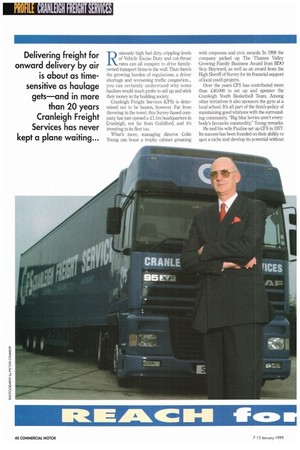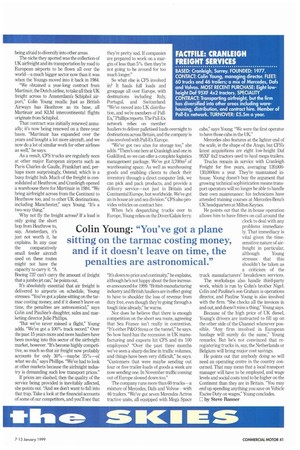Delivering freight for onward delivery by air is about as
Page 42

Page 43

If you've noticed an error in this article please click here to report it so we can fix it.
timesensitive as haulage gets—and in more than 20 years Cranleigh Freight Services has never kept a plane waiting... Ruinously high fuel duty, crippling levels of Vehicle Excise Duty and cut-throat rates can all conspire to drive familyowned transport firms to the wall. Then there's the growing burden of regulations, a driver shortage and worsening traffic congestion_ you can certainly understand why some hauliers would much prefer to sell up and stick their money in the building society
Cranleigh Freight Services (CFS) is determined not to be beaten, however. Far from throwing in the towel, this Surrey-based company has just opened a £1.1m headquarters in Cranleigh, not far from Guildford, and it's investing in its fleet too.
What's more, managing director Colin Young can boast a trophy cabinet groaning with corporate and civic awards. In 1998 the company picked up The Thames Valley Growing Family Business Award from BDO Stoy Hayward, as well as an award from the High Sheriff of Surrey for its financial support of local youth projects.
Over the years CFS has contributed more than 140,000 to set up and sponsor the Cranleigh Youth Basketball Team. Among other initiatives it also sponsors the gym at a local school. It's all part of the firm's policy of maintaining good relations with the surrounding community "Big blue lorries aren't everybody's favourite commodity," Young remarks.
He and his wife Pauline set up CFS in 1977. Its success has been founded on their ability to spot a niche and develop its potential without being afraid to diversify into other areas.
The niche they spotted was the collection of UK airfreight and its transportation by road to European airports to be flown all over the world—a much bigger sector now than it was when the Youngs moved into it back in 1984.
"We obtained a year-long contract from Martinair, the Dutch airline, to take all their UK freight across to Amsterdam's Schiphol airport," Colin Young recalls. Just as British Airways has Heathrow as its base, all Martinair and KIN intercontinental flights originate from Schiphol.
That contract was initially renewed annually; it's now being renewed on a three-year basis. "Martinair has expanded over the years and bought a lot more aircraft, and we now do a lot of similar work for other airlines as well," he says.
As a result, CFS trucks are regularly seen at other major European airports such as Paris Charles de Gaulle, Frankfurt and, perhaps more surprisingly, Ostend, which is a busy freight hub. Much of the freight is consolidated at Heathrow, and Cranleigh opened a warehouse there for Martinair in 1984. "We bring airfreight across from the Continent to Heathrow too, and to other UK destinations, including Manchester," says Young. "It's a two-way thing."
Why not fly the freight across? If a load is only going the short hop from Heathrow to, say, Amsterdam, it's just not worth it, he explains. In any case
the comparatively small feeder aircraft used on these routes might not have the capacity to carry it. "A Boeing 737 can't carry the amount of freight that a jumbo jet can," he points out.
It's absolutely essential that air freight is delivered to airports on schedule, Young stresses. "You've got a plane sitting on the tarmac costing money, and if it doesn't leave on time, the penalties are astronomical," says Colin and Pauline's daughter, sales and marketing director Julie Phillips "But we've never missed a flight," Young adds. "We've got a 100% track record." Over the past 15 years more and more hauliers have been moving into this sector of the airfreight market, however. "It's become highly competitive, so much so that air freight now probably accounts for only 30%—maybe 25%—of what we do," says Phillips. "We've had to look at other markets because the airfreight industry is demanding such low transport prices."
If prices are slashed, then the quality of the service being provided is inevitably affected, she points out. "And we don't want to fall into that trap. Take a look at the financial accounts of some of our competitors, and you'll see that they're pretty sad. If companies are prepared to work on a margin of less than 5% then they're not going to be around for too much longer."
So what else is CFS involved in? It hauls full loads and g-mupage all over Europe, with destinations including Italy, Portugal, and Switzerland. "We've moved into UK distribution, and we're members of PallEx," Phillips reports. The Pall-Ex network relies on member hauliers to deliver palletised loads overnight to destinations across Britain, and the company is also involved with Pall-Ex Europe.
"We've got two sites for storage too," she adds. "There's one here at Cranleigh and one in Guildford, so we can offer a complete logistics management package. We've got 3,700m2 of warehousing space. As well as warehousing goods and enabling clients to check their inventory through a direct computer link, we can pick and pack products, and provide a delivery service—not just in Britain and Continental Europe, but worldwide. We've got an in-house air and sea division." CFS also provides vehicles on contract hire.
When he's despatching trucks over to Europe, Young relies on the Dover/Calais ferry
"It's down to price and continuity," he explains, although he's not happy about the fare increases announced for 1999. "British manufacturing industry and British hauliers are in effect going to have to shoulder the loss of revenue from duty free, even though they're going through a tough time already," he warns.
Nor does he believe that there is enough competition on the short sea route, agreeing that Sea France isn't really in contention. "It's either P&O Stena or the tunnel," he says. So how hard has the recession in UK manufacturing and exports hit CFS and its 100 employees? 'Over the past three months we've seen a sharp decline in traffic volumes, and things have been very difficult," he says. "Customers that were maybe sending out four or five trailer-loads of goods a week are now sending one. In November traffic coming out of Europe slowed down too."
The company runs more than 60 trucks—a mixture of Mercedes, Dafs and Volvos—with 46 trailers. "We've got seven Mercedes Actros tractive units, all equipped with Mega Space cabs," says Young. "We were the first operator to have those cabs in the UK."
Mercedes also features at the lighter end of the scale, in the shape of the Atego, but CFS's latest acquisitions are eight low-height Daf 95XF 4x2 tractors used to haul mega-trailers.
Trucks remain in service with Cranleigh Freight for five years, averaging 120,000130,000km a year They're maintained inhouse. Young doesn't buy the argument that growing technical sophistication means transport operators will no longer be able to handle their own maintenance: his technicians have attended training courses at Mercedes-Benz's UK headquarters at Milton Keynes.
He points out that the in-house operation allows him to have fitters on call around the clock to deal with any problems immediately. That immediacy is vital given the timesensitive nature of airfreight in particular, although Young stresses that this shouldn't be taken as a criticism of the truck manufacturers' breakdown services.
The workshops also handle third-party work, which is run by Colin's brother Nigel. Colin and Pauline's son Graham is operations director, and Pauline Young is also involved with the firm. ''She checks all the invoices in and out, and doesn't miss a thing," Young says.
Because of the high price of UK diesel, Young's drivers are instructed to fill up on the other side of the Channel whenever possible. "Any firm involved in European haulage will surely do the same," Young remarks. But he's not convinced that reregistering trucks in, say, the Netherlands or Belgium will bring major cost savings.
He points out that anybody doing so will need an operating centre in the country concerned. That may mean that a local transport manager will have to be employed, and wage levels and social costs tend to be higher on the Continent than they are in Britain. "You may end up spending anything you save on Vehicle Excise Duty on wages," Young concludes.
by Steve Banner
































































































